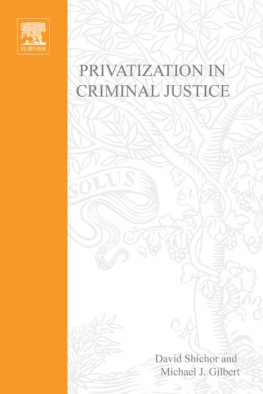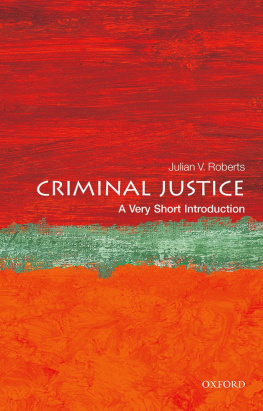Michael J Gilbert - Privatization of Criminal Justice: Past Present and Future
Here you can read online Michael J Gilbert - Privatization of Criminal Justice: Past Present and Future full text of the book (entire story) in english for free. Download pdf and epub, get meaning, cover and reviews about this ebook. year: 2001, publisher: Elsevier Science, genre: Politics. Description of the work, (preface) as well as reviews are available. Best literature library LitArk.com created for fans of good reading and offers a wide selection of genres:
Romance novel
Science fiction
Adventure
Detective
Science
History
Home and family
Prose
Art
Politics
Computer
Non-fiction
Religion
Business
Children
Humor
Choose a favorite category and find really read worthwhile books. Enjoy immersion in the world of imagination, feel the emotions of the characters or learn something new for yourself, make an fascinating discovery.
- Book:Privatization of Criminal Justice: Past Present and Future
- Author:
- Publisher:Elsevier Science
- Genre:
- Year:2001
- Rating:4 / 5
- Favourites:Add to favourites
- Your mark:
- 80
- 1
- 2
- 3
- 4
- 5
Privatization of Criminal Justice: Past Present and Future: summary, description and annotation
We offer to read an annotation, description, summary or preface (depends on what the author of the book "Privatization of Criminal Justice: Past Present and Future" wrote himself). If you haven't found the necessary information about the book — write in the comments, we will try to find it.
Privatization of Criminal Justice.
Privatization of Criminal Justice: Past Present and Future — read online for free the complete book (whole text) full work
Below is the text of the book, divided by pages. System saving the place of the last page read, allows you to conveniently read the book "Privatization of Criminal Justice: Past Present and Future" online for free, without having to search again every time where you left off. Put a bookmark, and you can go to the page where you finished reading at any time.
Font size:
Interval:
Bookmark:
Privatization in Criminal Justice
Past, Present, and Future
David Shichor
Michael J. Gilbert
Anderson Publishing
Privatization in Criminal Justice: Past, Present, and Future
Copyright 2000
Anderson Publishing Co.
2035 Reading Road
Cincinnati, OH 45202
Phone 800.582.7295 or 513.421.4142
Web Site www.andersonpublishing.com
All rights reserved. No part of this book may be reproduced in any form or by any electronic or mechanical means including information storage and retrieval systems without permission in writing from the publisher.
Library of Congress Cataloging-in-Publication Data
Shichor, David.
Privatization in criminal justice : past, present, and future / [edited by] David Shichor, Michael J. Gilbert.
xiii, 376 p. ; 26 cm.
Includes bibliographical references and index.
1583605002 (pbk.)
1. Prisons --United States. 2. Privatization --United States. 3. Corrections --Contracting out --United States. 4. Prisons --United States --Case studies.
HV9469 .P756 2001
365/.973 21
Cover design by Tin Box Studio, Inc.
A CQUISITIONS E DITOR Michael C. Braswell
The editors would like to thank each of the contributors for their research, hard work, perseverance, cooperation, and promptness in meeting deadlines. They maintained a positive attitude toward the project in spite of the frequent nagging by the editors. Since the authors of the chapters did most of the work, they are obviously responsible for all the shortcomings of their respective chapters. However, because our editorial suggestions undoubtedly enhanced their final product, we gracefully accept all the credit for the merits of the volume.
Seriously, it was an intellectually stimulating experience to collaborate with our contributors who made our editorial task relatively easy and definitely pleasant.
We also want to acknowledge the support and encouragement provided by our editors at Anderson Publishing CompanyMickey Braswell and Gail Eccleston.
Finally, we hope that the readers of this volume will benefit from the discussions in this book dealing with the important criminal justice policy issue of privatization.
Michael J. Gilbert
David Shichor
Private participation in the provision of public services including criminal justice is not a new phenomenon. That is especially true for countries having an Anglo-Saxon historical and cultural heritage. During the last two decades since the beginning of the Reagan and Thatcher administrations in the United States and the United Kingdom respectively, this trend has expanded in criminal justice. Currently, private companies not only continue their long-standing practice of supplying goods and services (food, medical care, education programs, etc.) to various components of the criminal justice system, but now they also control offenders. Thus, for-profit private companies and individuals are providing policing, inmate transportation, diversion programs, bail bonds, justice services, and management of confinement facilitiesjails and prisons.
Undoubtedly, this wide-scale private participation in such basic government functions as the keeping of peace and rendering of justice, both of which involve life and death decisions (use of deadly force), loss of liberty and punishment of citizens have an impact not only on the criminal justice system, but on society as a whole. The chapters in this volume focus on the nature and extent of this impact on the criminal justice system in the United States.
There are four major parts in the book. Part I reviews the history and the general issues behind the growing use of privatization within criminal justice. Smith and Morn focus on the history of privatization across the justice system. Their discussion makes it clear that privatization in criminal justice has deep roots in the history of western culture. They document the existence of two justice systems, one for those with economic resources and one for those without. Historically, the private exercise of justicepolicing, confinement, and prosecutionallowed affluent offenders to benefit from both more lenient treatment and a broader range of services. Stoltz analyzes the potential influence of private actors in the criminal justice system upon justice policymaking. She describes the development of subgovernments in various components of the criminal justice system. These subgovernments involve formal and informal relationships between public and private actors to influence public policy. Depending on the power balances, at different times and on different issues, one side may become more influential than the others in determining policy. The third chapter in this part, by Gilbert How Much Is Too Much Privatization in Criminal Justice frames the boundary issues surrounding the use of privatization in criminal justice. He suggests a set of parameters defining appropriate and inappropriate forms of privatization and provides a model for understanding and managing the risks that come with privatization.
Part II focuses on privatization in various components of the criminal justice system. Calder provides a critical analysis of private policing and security. He shows how the distinction between public and private policing is becoming blurred. Traditional police functions are increasingly performed by corporations, while public police personnel are increasingly involved in providing services for private use. The author examines the legal implications of this blurring between public and private policing. In the chapter titled Rent-a-Judge and Hide a Crime, Judge Russell describes the increasing trend toward use of private judges in resolving disputes without making them public. This is particularly attractive to corporations that have the ability to use the civil justice system in avoiding criminal procedures for their law and regulatory violations. This strategy, while helping to decrease the pressure on the criminal justice system, at the same time allows influential groups to maintain a positive public image. This manipulation is not open to the typical working-class clients of the criminal justice system.
Sechrest and Robby discuss public and private substance abuse treatment programs. The private sector has been extensively involved in offender treatment programs of all types for a long time. There is a proliferation of programs managed by both for-profit and non-profit (religious, self-help, and other) organizations. When it comes to treatment of offenders, those organizations operate under contract or agreement with government agencies or the courts. This relationship may involve direct public funding or payment by clients who are under court order. The authors' review identifies some differences in the operations of private for-profit, non-profit, and public treatment programs in spite of the fact that there are few direct comparisons available. Furthermore, because of large number of programs using a wide variety of treatment techniques, evaluations are sparse and difficult to conduct. But as the authors point out, evaluations are badly needed.
The chapter by Kiekbusch focuses on the unique character of jail privatization. Jails represent a large market that has been greatly underutilized by the private confinement industry. Kiekbusch documents the nature and scope of the current state of private sector jail operations and distinguishes it from prison privatization. Perhaps the most unique and important aspect of this chapter is Kiekbusch's analysis of the constraining factors that limit private sector involvement in operations. Yet, jails are probably the high dollar market of the future for criminal justice privatization.
Font size:
Interval:
Bookmark:
Similar books «Privatization of Criminal Justice: Past Present and Future»
Look at similar books to Privatization of Criminal Justice: Past Present and Future. We have selected literature similar in name and meaning in the hope of providing readers with more options to find new, interesting, not yet read works.
Discussion, reviews of the book Privatization of Criminal Justice: Past Present and Future and just readers' own opinions. Leave your comments, write what you think about the work, its meaning or the main characters. Specify what exactly you liked and what you didn't like, and why you think so.






